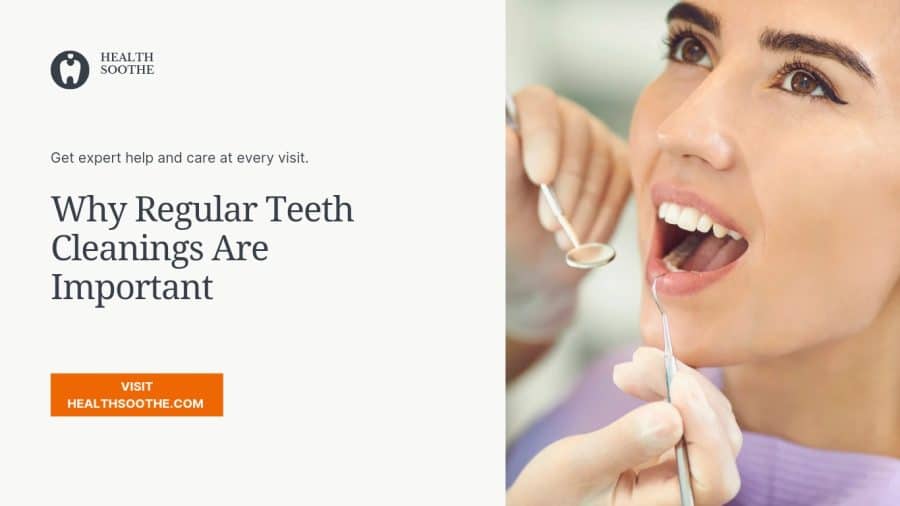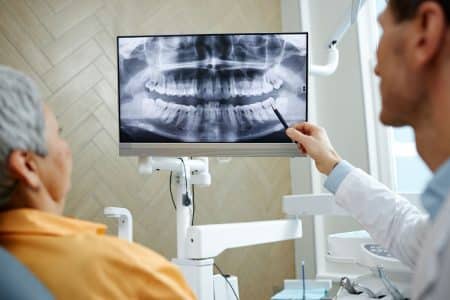Regular toothbrushing and flossing are essential to keeping your teeth and gums healthy. However, even if you have flawless oral hygiene habits at home, it’s still not enough to deep clean some of the harder-to-reach spaces in the mouth. Without regular dental cleanings, the teeth and gums are susceptible to infection and decay, both of which can be detrimental to your oral and overall health. For optimal dental health, professional teeth cleanings 1https://www.padoniadentalassociates.com/blog/post/the-importance-of-regular-teeth-cleanings.html should be a staple of your oral hygiene treatment plan.
Here are just some reasons professional cleanings with your dentist are so important and what to expect when you schedule your next routine appointment.
Four Reasons Cleanings Matter
1. Preventive care: Cleanings performed by your dentist help address harmful bacteria and plaque that at-home brushing alone can’t remove. Combined with your daily oral hygiene routine, professional cleanings help combat common dental problems such as:
- Tooth decay: Cavities form when plaque accumulate on the teeth and combine with sugars to produce harmful acids that attack tooth enamel. A professional cleaning allows the dentist to eliminate stubborn build-up, which reduces the risk for decay.
- Gum disease: If tartar begins to build up and push underneath your gums, it can lead to gum disease. This serious infection damages soft tissues and can ultimately destroy the bone that supports your teeth. When you combine professional cleanings with your normal oral hygiene routine, you could reverse early signs of gum disease to avoid serious health issues.
- Tooth loss: When cavities or gum disease have advanced beyond their earliest stages, tooth extraction may be the only option. The good news is that most natural teeth can be saved when caught early during regular exams and treated by your dentist.
2. Early detection of problems: Seeing your dentist twice a year is the best way to keep dental issues at bay. During a regular cleaning and exam, your dentist will examine your mouth to detect warning signs of potential issues before they become more serious. Early treatment can save you time, money and a lot of pain in the future.
3. Improved overall health: It’s easy to associate dental cleanings 2https://www.absolutedental.com/blog/having-your-teeth-cleaned-regularly/ only with oral health. However, the reality is that your oral health and overall health are closely related. Studies show that bacteria from your mouth can contribute to other diseases and conditions, including heart disease, diabetes and pregnancy complications. So, if you want to improve your overall health, you could start with a visit to your dentist’s office.
4. Beautiful smile: If your teeth are discolored from consuming highly pigmented foods and drinks — such as coffee or red wine — a dental cleaning may help. That’s because a professional cleaning doesn’t just remove plaque and tartar; it can also remove surface stains from your tooth enamel to produce a whiter, fresher smile.
What to Expect During Your Cleaning
Most general dentists recommend dental cleanings 3https://www.dentalone-ga.com/blog/7-important-benefits-of-dental-cleanings/ twice a year to ensure optimal oral health. In some cases, these visits may be advised on a more frequent basis — such as every three months — if you are more susceptible to gum disease or cavities.
During your routine appointment, a hygienist will use special dental instruments to thoroughly clean your teeth. Using a small mirror and a tool called a scaler, the hygienist will gently remove plaque and tartar around your gum line and between your teeth.
Once the tartar has been eliminated, each tooth is cleaned and polished using a high-powered electric brush. The hygienist will then floss between each tooth to eliminate any left-over debris.
The final step usually involves the application of a fluoride treatment. Fluoride re-mineralizes the enamel of the teeth, which helps fight off decay and strengthen the teeth altogether.
Following the cleaning, the dentist will examine the patient’s mouth and jaw to look for signs of decay, gum disease or any other changes that may require treatment. An x-ray may also be taken of your mouth in order to check for other unseen issues.
Brush Up on At-home Dental Care
Between cleanings, it is important that you continue to practice good oral hygiene habits at home, including the following:
- Brush your teeth at least twice a day for two minutes each time. Use a toothpaste with fluoride and choose a soft-bristled brush that can reach all the surfaces of your teeth.
- Floss at least once a day to remove food and plaque from along the gumline and in areas where your toothbrush can’t reach.
- Follow a well-balanced diet to avoid decay and promote strong, healthy teeth.
Bottom line: Don’t wait for dental problems to appear before you see your dentist. Combine good daily hygiene practices with twice-a-year oral examinations and cleanings to help keep your natural smile healthy and beautiful for life. As you get to know your dentist and the practice, you can begin feeling more comfortable in their care and, most importantly, more confident in your smile!
Author bio: Dr. Stephen Wallace has 26 years of experience in the dental industry. His practice, Stephen Wallace DDS, focuses on patient care and oral health care.
Additional resources and citations
- 1https://www.padoniadentalassociates.com/blog/post/the-importance-of-regular-teeth-cleanings.html
- 2https://www.absolutedental.com/blog/having-your-teeth-cleaned-regularly/
- 3https://www.dentalone-ga.com/blog/7-important-benefits-of-dental-cleanings/


